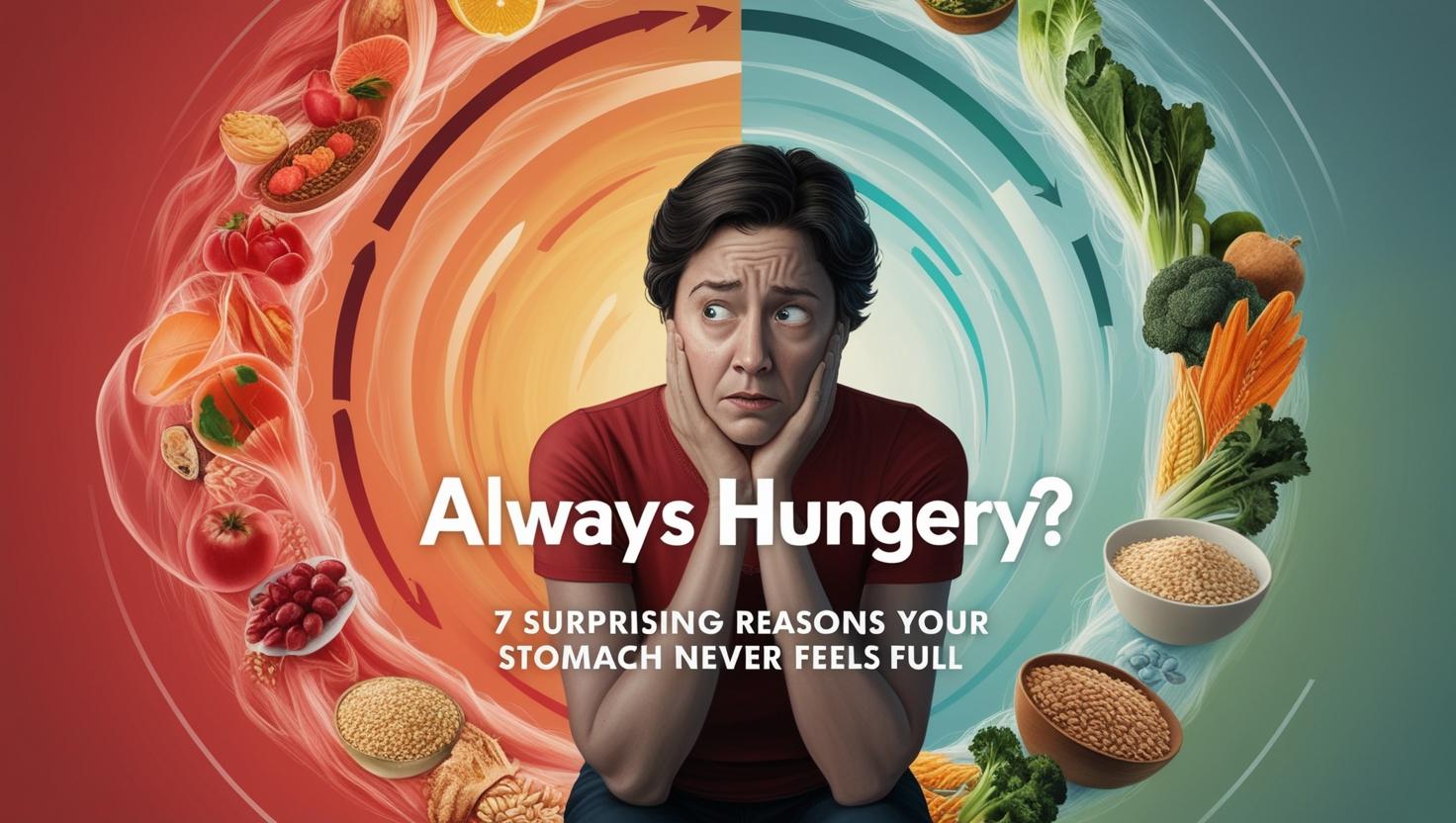Always Hungry? 7 Surprising Reasons Your Stomach Never Feels Full

Ever feel like your stomach’s got a mind of its own, constantly begging for food even when you’ve just eaten? You’re not alone! Many people wrestle with relentless hunger, and it can be downright frustrating—like trying to fill a bottomless pit. Let’s explore why this happens and, more importantly, what you can do about it.
1. Always Hungry? Your Diet Might Be Playing Tricks on You
Think of your body as a car—if you fuel it with the wrong stuff, it won’t run right.
- Too Many Refined Carbs
Ever noticed how a sugary snack or a big bowl of white pasta leaves you hungrier than before? These foods are like fireworks: they give you a quick burst of energy, but it fizzles out fast. That sugar crash signals your body to eat more, even when it doesn’t need to. - Not Enough Protein
Protein is like the bouncer at a club—it keeps your hunger hormones in check. If your meals are skimpy on chicken, eggs, or beans, your stomach’s likely to start growling long before it should. - Skipping Fibre
Imagine eating a meal and still feeling like you haven’t had enough. That’s what happens when you don’t get enough fibre from fruits, veggies, and whole grains. Fibre keeps things moving slowly in your digestive system, giving you that full, satisfied feeling.
2. Hormones: The Puppet Masters of Hunger
- Leptin Resistance
Leptin is your body’s “I’m full” signal. But for some people, especially those with extra body fat, it’s like their brain has hung up on the call. Even after eating, they’re always hungry and left feeling peckish. - High Ghrelin Levels
Ghrelin is the “hungry hormone,” and for some of us, it’s like a noisy neighbor who won’t stop knocking. High levels can keep you feeling snacky all day. - Insulin and Blood Sugar Roller Coasters
If you have insulin resistance or diabetes, your cells aren’t soaking up glucose like they should. So, your body stays in hunger mode, even when there’s plenty of fuel in the tank.

3. Stress and Emotions: The Sneaky Culprits
Let’s talk about stress. We all have it—it’s like that annoying roommate who refuses to leave. But did you know stress can mess with your hunger in ways that make you feel like a bottomless pit? Let’s break it down.
Stress: Your Brain’s Alarm System
When life gets chaotic—whether it’s work deadlines, family drama, or even just trying to find a parking spot in a crowded lot—your body releases cortisol, the stress hormone. Now, cortisol has a job to do. It’s there to help you survive by sending signals that scream, “Get energy! You need fuel for the battle!” The problem? There’s no battle, just a pile of emails or a toddler melting down in aisle five.
This hormonal surge flips a switch in your brain that craves quick energy, aka comfort food. You know the drill: cookies, chips, pizza—things that go straight to your soul and your waistline. It’s like your body’s trying to say, “We’re stressed—throw snacks at it!”
Why Stress Makes You Crave Junk Food
Your body’s pretty clever—under stress, it doesn’t crave kale or quinoa. Nope, it wants high-fat, high-sugar comfort foods. Why? These foods release a surge of dopamine, the “feel-good” chemical in your brain. It’s like a quick hit of happiness to distract you from whatever’s bugging you…leaving you always hungry.
But, just like with stress itself, this is a short-term fix. That dopamine rush fades, and you’re left wanting more. It’s a vicious cycle: stress makes you eat, eating makes you feel better temporarily, and then stress returns, louder than before.
Chronic Stress and Constant Hunger
If stress sticks around for weeks, months, or even years, it can start to reprogram your hunger hormones. Your body pumps out more cortisol on the regular, keeping your appetite dialed up to 11. At the same time, your “fullness signals” might get quieter, leaving you feeling like you’re never truly satisfied.
Let’s put it this way: if stress were a person, it’d be that one friend who orders dessert after you’ve already split the bill. Annoying, persistent, and always making you pay more than you planned.

4. Sleep Deprivation: The Silent Hunger Booster
Skipping out on sleep is like leaving the door open for hunger to stroll in. When you’re tired, your body lowers leptin (the fullness hormone) and ramps up ghrelin (the hungry hormone). It’s like your body is saying, “We’re low on energy; send in the snacks!”
5. Hidden Medical Causes
Sometimes, constant hunger isn’t just about food or stress. It could be your body trying to tell you something deeper.
- Diabetes
High blood sugar levels can make your body feel like it’s starving, even when you’ve eaten plenty. - Hyperthyroidism
An overactive thyroid is like a furnace running too hot—it burns through energy fast, leaving you ravenous and always hungry. - Medications
Some meds, like steroids or antidepressants, have a pesky side effect: an appetite that won’t quit.
6. Could It Be Your Lifestyle?
Let’s be honest—life gets busy, and we don’t always treat our bodies like we should.
- Skipping Meals
Go too long without food, and your body panics, demanding a feast. Then, before you know it, you’re eating enough to feed a small village. - Not Drinking Enough Water
Fun fact: your body can confuse thirst with hunger. So, next time you feel hungry, try drinking a big glass of water first—it might be just what your body needs.
7. Your Gut: The Hunger Whisperer
Your gut isn’t just about digestion—it’s a big player in controlling hunger. If your gut bacteria are out of whack, they can send some pretty confusing signals to your brain, making you crave more food than you actually need.

So, What Can You Do About It?
- Focus on Whole Foods
Stick to high-protein, high-fibre meals with healthy fats like avocado or olive oil. Think eggs and veggies for breakfast or grilled chicken with quinoa for dinner. - Stay Hydrated
Keep a water bottle handy and sip throughout the day. - Get Good Sleep
Aim for 7–9 hours of quality shut-eye each night to keep hunger hormones balanced. - Manage Stress
Try walking, meditating, or even dancing it out in your living room. Find what works to keep stress under control. - Check in with Your Doctor
If hunger is out of control despite these changes, it’s worth chatting with a healthcare professional.
Feeling constantly hungry doesn’t mean you’re weak or doing something wrong. It’s just your body trying to get your attention. Listen to it, make a few tweaks, and you’ll likely feel much more in control. And remember, it’s not about eating less; it’s about eating smarter.
pHix, our Mature Hops Extract based natural supplement, helps with many of these reasons for always feeling hungry. It suppresses appetite, improves quality of sleep and lowers stress levels. Find out more HERE.
